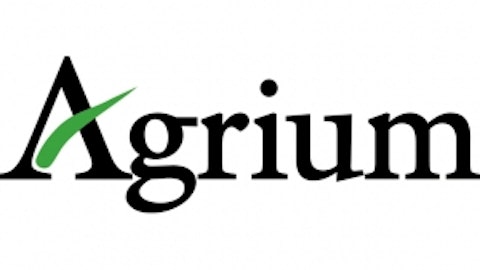I watched in dismay as fertilizer stocks tanked on Friday after an influential analyst barged in with a string of downgrades. Dahlman Rose didn’t leave many – Potash Corp./Saskatchewan (USA) (NYSE:POT), CF Industries Holdings, Inc. (NYSE:CF), Agrium Inc. (USA) (NYSE:AGU), and Rentech Nitrogen Partners LP (NYSE:RNF) were bundled up in the ‘sell’ room, while Mosaic Co (NYSE:MOS) was demoted to ‘hold.’ All I know is that if you dumped your stock because Dahlman said so, you may come to regret it.

Fool colleague Rich Smith was right to point out that Dahlman sports 75% accuracy in its chemical picks on Motley Fool CAPS and has a brilliant point score, but that’s just half the story. The top five stock picks where Dahlman scored the highest don’t include a single fertilizer player, and the three where it misses most are all fertilizer stocks, including CF and PotashCorp.
More important, why should Dahlman’s on-and-off ratings affect any Foolish investor? Investing is not about a month or a quarter. How much faith can you put in an analyst that does a complete 180 in less than a month’s time? You don’t believe me?
Case in point: Dahlman upgraded CF to a buy on Jan. 24 this year. On Feb. 22, it turned into a sell call. In between, CF had already shed 10%. So those who dove into CF on Jan. 24 just because Dahlman thought they should are deep in the red now. Dahlman scored a double whammy with Agrium as well, which was gifted an upgrade on the same day as CF. By Friday, Agrium’s stock had lost 6%.
When opinions differ
In January, Dahlman analysts believed that “most of the benefit we see will be on the nitrogen products.” And this is what Dahlman had to say last Friday: “We believe that the best market conditions for [Nitrogen, Phosphorus, and Potassium fertilizers] are behind them as new capacity moves forcefully ahead.” Do market fundamentals really swing so fast?
First, new capacity takes years to come online in a capital-intensive industry like fertilizers. Second, even if a company’s project is near completion, it will probably wait to bring it on until the existing machines are fully utilized. Companies that deal in potash and phosphate such as PotashCorp, Mosaic, and Agrium scaled down production considerably last year as demand from key global markets dried up. Recent contracts from China and India means these companies should have a better year as compared to 2012, but I do not see any over-capacity.
I don’t think even CF will second Dahlman’s thoughts. In fact, CF expects a robust nitrogen market for the first half of 2013 “given strong demand and limited supply due to the delays in new capacity coming online.” Agrium sees “supply uncertainty” to support the nitrogen market. Corn prices may have softened but farmers are flush with cash, even those that were hit by the ravaging drought last year, thanks to crop insurance pay-outs. The USDA expects all-time high corn acreage this spring with record farm income. Also, drought conditions still prevail in large parts of major corn-growing areas. If they don’t improve, output could be restricted, which in turn could keep a check on crop price declines.





